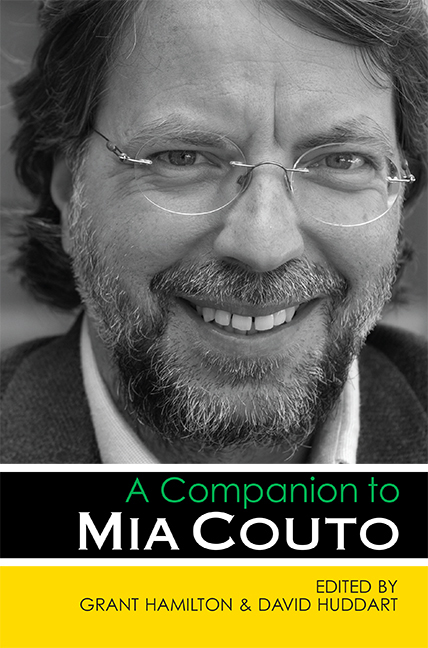Book contents
- Frontmatter
- Dedication
- Contents
- Acknowledgements
- Notes on Contributors
- Introduction
- An Interview with Mia Couto
- 1 Mia Couto in Context
- 2 Uma coisa fraterna Mia Couto & the Mutumbela Gogo Theater Group
- 3 Reading Raiz de orvalho Counterpointing Literary Genres in the Work of Mia Couto
- 4 Spaces of Magic Mia Couto’s Relational Practices
- 5 Mia Couto or the Art of Storytelling
- 6 The Multiple Worlds of Mia Couto
- 7 ‘Ask Life’ Animism & the Metaphysical Detective
- 8 Mia Couto & Translation
- 9 Jesusalém Empty Fathers & Women’s Texts
- 10 Trauma Repetition & Pure Repetition in The Tuner of Silences
- 11 Seeing Like a Crocodile Bird Mia Couto’s The Last Flight of the Flamingo
- 12 Mia Couto & Nostalgia Reading The Last Flight of the Flamingo
- 13 Mia Couto, Contexts & Issues A Bibliographic Essay
- Bibliography
- Index
1 - Mia Couto in Context
Published online by Cambridge University Press: 22 May 2021
- Frontmatter
- Dedication
- Contents
- Acknowledgements
- Notes on Contributors
- Introduction
- An Interview with Mia Couto
- 1 Mia Couto in Context
- 2 Uma coisa fraterna Mia Couto & the Mutumbela Gogo Theater Group
- 3 Reading Raiz de orvalho Counterpointing Literary Genres in the Work of Mia Couto
- 4 Spaces of Magic Mia Couto’s Relational Practices
- 5 Mia Couto or the Art of Storytelling
- 6 The Multiple Worlds of Mia Couto
- 7 ‘Ask Life’ Animism & the Metaphysical Detective
- 8 Mia Couto & Translation
- 9 Jesusalém Empty Fathers & Women’s Texts
- 10 Trauma Repetition & Pure Repetition in The Tuner of Silences
- 11 Seeing Like a Crocodile Bird Mia Couto’s The Last Flight of the Flamingo
- 12 Mia Couto & Nostalgia Reading The Last Flight of the Flamingo
- 13 Mia Couto, Contexts & Issues A Bibliographic Essay
- Bibliography
- Index
Summary
What would become, in the course of time, the discipline of postcolonial studies has its roots in the theoreticians and writers of the Anglophone and Francophone worlds – writers such as Aimé Césaire, Frantz Fanon, and Chinua Achebe. As a specifically academic field of study, it was pioneered in the universities of the English-speaking world. For a number of years, it was assumed that literature from the former colonies of Portugal would be no more than a derivative of what was happening in the English- and French-speaking ex-colonies. However, in recent years the writing of cultural theorists such as Walter Mignolo, in the case of Latin America, or Boaventura de Sousa Santos in Portugal, has encouraged scholars in Portugal and Brazil, and elsewhere, to think in terms of a form of postcolonialism that is unique to the experience of the former colonies of Portugal and Spain. In addition, the availability in translation of literary works from Portuguese-speaking Africa, as well as Brazil, has slowly begun to make the Lusophone experience more widely known, and this development is exemplified by the present volume on Mia Couto.
One of the most important contributions that scholarship can make to the advancement of knowledge about writing in Portuguese from Africa, America or Asia is to counteract the pigeonholing effects of literary criticism in the mainstream media. It is, for example, hardly an exaggeration to say that it is a sine qua non of reviews of literary fiction translated from Portuguese that writers must be labelled as magical realists – a relic, somehow, of the boom years of the Latin American novel of half a century ago. The benchmark here is inevitably the fiction of Gabriel García Márquez, and his cult novel, Cien años de soledad (1967), first published in English in 1970 as One Hundred Years of Solitude. ‘Magical realism’ is a term that has been attached in the Anglophone press to such diverse writers as the Portuguese winner of the Nobel Prize in Literature José Saramago and the younger Mia Couto. It is a lazy, journalistic term to describe what is assumed to be a peculiarly Ibero-American belief system in which supernatural, unexplained events have a direct effect on tangible reality to create a world in which the implausible and the real mingle in daily life.
- Type
- Chapter
- Information
- A Companion to Mia Couto , pp. 17 - 24Publisher: Boydell & BrewerPrint publication year: 2016



